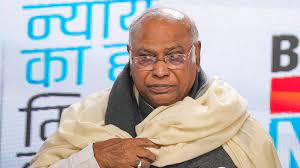
In a firm stand against the concept of “One Nation, One Election,” the Congress party criticized the idea as undemocratic and detrimental to federalism and the basic structure of the Constitution. Congress chief Mallikarjun Kharge urged for the dissolution of the committee tasked with studying the feasibility of implementing the ‘one nation, one election’ system in a country of 140 crore people.
Kharge, in a letter to Niten Chandra, the committee’s secretary, expressed the Congress party’s strong opposition to the idea and called for abandoning it entirely. He asserted that for the sake of maintaining a thriving and robust democracy, the high-powered committee should be dissolved.
Highlighting concerns about the committee’s impartiality, Kharge argued that the composition of the committee appeared biased, having been formed without discussions with opposition parties that hold power in various states. He emphasized that decisions made by the committee would impact these states, making the consultation process appear to be a mere pretense.
Kharge also disputed the argument that simultaneous elections would result in financial savings, stating that election expenses are a minimal fraction of the total Union Budget. He suggested that the people would consider this expense as a small cost for upholding free and fair elections, essential for preserving democracy.
The Congress chief criticized the committee’s call for public suggestions, alleging that it seemed to have already made up its mind and that seeking input was merely a formality. He urged the government, parliament, and the Election Commission of India to prioritize respecting the people’s mandate rather than diverting attention with undemocratic ideas like simultaneous elections.
The ‘One Nation, One Election’ committee, headed by the former President of India, is tasked with examining whether constitutional amendments are required for simultaneous elections and if so, whether they would need ratification by the states. The government’s justification for the initiative includes concerns about massive expenditure, diversion of security forces, and disruption in developmental work due to frequent elections.
The Congress party’s opposition to the concept adds a layer of complexity to the ongoing discussions surrounding the feasibility and implications of holding simultaneous elections in India.
Sources By Agencies




